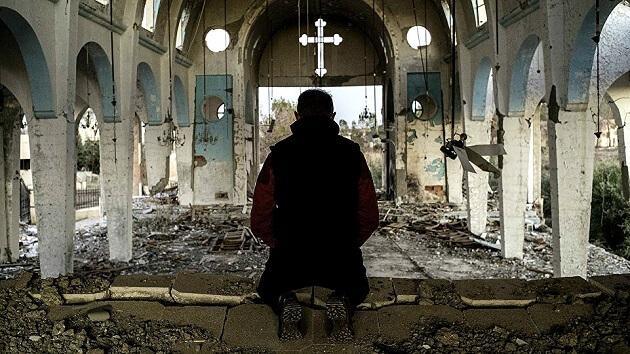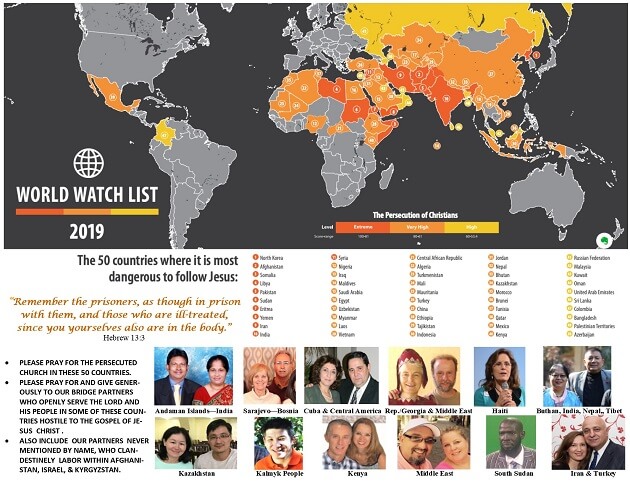

FROM R.K.’S CORNER: In 1983, The Bridge was born during one of my visits behind the Iron Curtain while providing suffering Christians, persecuted under the oppressive atheist regime of the Soviet Union, with Bibles and other resources. Intercession and prayers for the persecuted Church throughout the world has therefore always been at the core of our ministry, especially as most of our Bridge Partners live and serve in nations hostile to the Christian faith.
Governments in Western Europe and the Unites States have traditionally been on the forefront in supporting liberty and freedom of expression of faith. However, in later years as the wave of secularism and cultural pluralism have greatly increased, the voice of the suffering church has been silenced, both by governing authorities and most church leaders in the West. However, change is happening! On Monday, Sep. 23, during the week of the annual United Nations General Assembly, President Trump will be hosting and speaking at the Global Call to Protect Religious Freedom. The U.S. Administration is taken a stand on behalf of those persecuted for their faith.
Earlier this year, in an effort to inform governments and the general public about the alarming increase in religious oppression, especially among Christians, a comprehensive Independent Review of current Persecution of Christians worldwide, done under the leadership of Bishop of Truro in London, was presented to the Foreign Secretary of The Foreign and Commonwealth Office (FCO) in England.
Due to limited space on this website, I have published only a brief overview of the Report. In its entirety, it is a great resource for you, your church leaders, and prayer groups. Please download the .pdf file of the Report from this link, read it, and distribute it to others, and— PLEASE PRAY:
https://christianpersecutionreview.org.uk/interim-report/

OVERVIEW — THE SCALE OF RELIGIOUS PERSECUTION
Persecution on grounds of religious faith is a global phenomenon which is growing in scale and intensity. Reports including that of the United Nations (UN) Special Rapporteur on ‘Freedom of Religion and Belief’ (FoRB) suggest that religious persecution is on the rise, and it is an “ever-growing threat” to societies around the world. Though it is impossible to know the exact numbers of people persecuted for their faith, based on reports from different NGOs, it is estimated that one third of the world’s population suffers from religious persecution in some form, with Christians being the most persecuted group. This despite the fact that freedom of religion and belief is a fundamental right of every person. This includes the freedom to change or reject one’s own belief system.
The UN Universal Declaration of Human Rights (UDHR) in Article 18 defines religious human rights in this way: “Everyone has the right to freedom of thought, conscience, and religion; this right includes freedom to change his religion or belief, and freedom, either alone or in community with others and in public or private, to manifest his religion or belief in teaching, practice, worship, and observance.” (The Universal Declaration of Human Rights)
Despite the fact that the UDHR is foundational to the UN Charter which is binding on member states, and that ‘the denial of religious liberty is almost everywhere viewed as morally and legally invalid’, in today’s world, religious freedom is far from being an existential reality. The Review Terms of Reference called for ‘persecution and other discriminatory treatment’ to be researched.
In the absence of an agreed academic definition of ‘persecution’ the Review has proceeded on the understanding that persecution is discriminatory treatment where that treatment is accompanied by actual or perceived threats of violence or other forced coercion.
Why a focus on Christian persecution? The Report argues that a focus on Christian persecution must not be to the detriment of other minorities, but rather helping and supporting them. However, research consistently indicates that Christians are “the most widely targeted religious community”. Furthermore, the evidence suggests that acts of violence and other intimidation against Christians are becoming more widespread. The reporting period revealed an increase in the severity of anti-Christian persecution. In parts of the Middle East and Africa, the “vast scale” of the violence and its perpetrators’ declared intent to eradicate the Christian community has led to several Parliamentary declarations in recent years that the faith group has suffered genocides according to the definition adopted by the UN. Against this backdrop, academics, journalists and religious leaders (both Christian and non-Christian) have stated that, as Cambridge University Press puts it, the global persecution of Christians is “an urgent human rights issue that remains underreported”. An op-ed piece in the Washington Post stated: “Persecution of Christians continues… but it rarely gets much attention in the Western media. Even many churchmen in the West turn a blind eye.” Journalist John L Allen wrote in The Spectator: “The global war on Christians remains the greatest story never told of the early 21st century.”
There is widespread evidence showing that “today, Christians constitute by far the most widely persecuted religion.” Finding once again that Christianity is the most persecuted religion in the world, the Pew Research Center concluded that in 2016 Christians were targeted in 144 countries – a rise from 125 in 2015. According to Pew Research, “Christians have been harassed in more countries than any other religious group and have suffered harassment in many of the heavily Muslim countries of the Middle East and North Africa.” Reporting “a shocking increase in the persecution of Christians globally”, Christian persecution NGO Open Doors (OD) revealed in its 2019 World Watch List Report on anti-Christian oppression that “approximately 245 million Christians living in the top 50 countries suffer high levels of persecution or worse”, 30 million up on the previous 23 year.
Open Doors stated that within five years the number of countries classified as having “extreme” persecution had risen from one (North Korea) to 11. Both OD and Aid to the Church in Need (ACN) have highlighted the increasing threat from “aggressive nationalism” or “ultra-nationalism” in countries such as China and India – growing world powers – as well as from Islamist militia groups. According to Persecution Relief, 736 attacks were recorded in India in 2017, up from 348 in 2016. With reports in China showing an upsurge of persecution against Christians, between 2014 and 2016, government authorities in Zheijiang Province targeted up to 2,000 churches, which were either partially or completely destroyed or had their crosses removed.
The Report shows not only the geographic spread of anti-Christian persecution, but also its increasing severity. In some regions, the level and nature of persecution is arguably coming close to meeting the international definition of genocide, according to that adopted by the UN. The eradication of Christians and other minorities on pain of “the sword” or other violent means was revealed to be the specific and stated objective of extremist groups in Syria, Iraq, Egypt, north-east Nigeria and the Philippines. An intent to erase all evidence of the Christian presence was made plain by the removal of crosses, the destruction of Church buildings and other Church symbols. The killing and abduction of clergy represented a direct attack on the Church’s structure and leadership. Where these and other incidents meet the tests of genocide, governments will be required to bring perpetrators to justice, aid victims and take future preventative measures. The main impact of such genocidal acts against Christians is exodus.
Christianity now faces the possibility of being wiped-out in parts of the Middle East where its roots go back furthest. In Palestine, Christian numbers are below 1.5 percent; in Syria the Christian population has declined from 1.7 million in 2011 to below 450,000; in Iraq, Christian numbers have slumped from 1.5 million before 2003 to below 120,000 today. Christianity is at risk of disappearing, representing a massive setback for religious plurality in the region.
In its 2017 ‘Persecuted and Forgotten?’ report on Christian persecution, ACN stated: “In terms of the number of people involved, the gravity of the crimes committed and their impact, it is clear that the persecution of Christians is today worse than at any time in history.”
Given the scale of persecution, the response of the media and western Governments has come under increasing criticism. Former Chief Rabbi Jonathan Sacks told the House of Lords: “The persecution of Christians throughout much of the Middle East, sub-Saharan Africa and Asia, [and] elsewhere is one of the crimes against humanity of our time and I’m appalled at the lack of protest it has evoked”. This echoes the Latin Patriarch of Jerusalem, Fouad Twal: “Does anybody here hear our cry? How many atrocities must we endure before someone comes to our aid?”
Due to the scale of persecution of Christians today, indications that it is getting worse and that its impact involves the decimation of some of the faith group’s oldest and most enduring communities, the need for governments to give increasing priority and specific targeted support to this faith community is not only necessary, but urgent.
South Asia
There the growth of militant nationalism has been the key driver of Christian persecution. The existence of Anti Conversion Laws, Blasphemy Laws, and International NGO Registration Limitations are key factors in the suppression of the Christian faith.
Sub-Sahara Africa
While the 2014-19 period saw government crackdowns on Christians, notably in Eritrea, the most widespread and violent threat came from societal groups, including many with a militant Islamist agenda – the most serious being Boko Haram in Nigeria, where direct targeting of Christian believers on a comprehensive scale set out to “eliminate Christianity and pave the way for the total Islamization of the country”.
East Asia
The extensive persecution is driven both by the authoritarian actions of governments influenced by communist and nationalist outlooks and by Islamic militancy found both within the state and within civil society. Ideologies which aim to ensure complete control, turning the ‘other’ into deviants are prevalent, causing high levels of persecution.
Central Asia
The situation is bleak as governments and authorities have further enforced a widespread crackdown on churches and Christian activities. Protestant, Evangelical and Pentecostal Christians are more likely to be persecuted than Catholics and Orthodox Christians.
Latin America
The main drivers of persecution in Latin America are a combination of illegal organizations, state authorities and rival human rights claims by indigenous groups, especially in Mexico and Colombia, as well as state-sponsored persecution in Cuba and Venezuela. Please save and print this image, keep it for you to pray and give it to others to intercede.
Please save and print this image, keep it for you to pray and give it to others to intercede.
